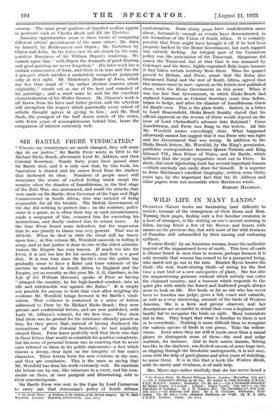SIR BARTLE FRERE VINDICATED.*
" UNLESS my countrymen are much changed, they will some day do me justice," Sir Bartle Frere wrote in 1879 to Sir Michael Hicks Beach, afterwards Lord St. Aldwyn, and then Colonial Secretary. Nearly forty years have passed since Sir Bartle died, and it is only now that, by this book, his reputation is cleared and his career freed from the shadow that darkened its close. Numbers of people must still remember the storm of excited feeling which swept the country when the disaster of Isandhlwana. in the first stage of the Zulu War, was announced, and recall the attacks that were made on Sir Bartle, then Governor of the Cape and High Commissioner in South Africa, who was accused of being responsible for all the trouble. The British Government of the day did nothing to protect him ; on the contrary, politi- cians in a panic, as is often their way in such circumstances, made a scapegoat of him, censured him for exceeding his instructions, and finally ordered him to return home. At the time Frere found some defenders, but the impression that he was greatly to blame was very general. That was in 1879-80. When he died in 1884 the cloud still lay heavy upon him ; in this volume Mr. Worsfold succeeds in rolling it away, and at last justice is done to one of the ablest adminis- trators the Empire has ever known. If much too late for Frere, it is not too late for his memory, and that is a good deal. It is true that since Sir Bartle's time the public has gradually come to have a fairer and truer estimate of the services he rendered in South Africa to England and the Empire, yet as recently as this year Mr. A. G. Gardiner, in his Life of Sir William Harcourt, speaks of Frere as having " plunged the country, by his high-handed conduct, into an idle and indefensible war against the Zulus." It is simply not possible for anyone to hold that view after weighing the evidence Mr. Worsfold brings forward in Sir Bartle's vindi- cation. That evidence is contained in a series of letters addressed to Frere by Sir Michael Hicks Beach ; they were private and confidential letters, and are now published, with Lady St. Aldwyn's consent, for the first time. They show that there was no ground for the strictures officially passed on him, for they prove that, instead of having disobeyed the instructions of the Colonial Secretary, he had implicitly obeyed them. Frere knew perfectly well that there was that in these letters that would re-establish his position completely, but his sense of personal honour was so exacting that he never once referred to them in his public statements—a fact which throws a strong, clear light on the integrity of this man's character. These letters form the new evidence in the case, and they are conclusive. This is the same as saying that Mr. Worsfold has done his work extremely well. He marshals the letters one by one, like witnesses in a court, and his com- ments on them, at once pungent and illuminating, add to their convincingness.
Sir Bartle Frere was sent to the Cape by Lord Carnarvon to carry out that statesman's policy of South African
• .Sir Bartle Here : d Footnote to the History of the British Empire. By W. Basil Worsfold. London : Thornton Butterworth. (25s. net.]
confederation. Some thirty years later confederation came about, fortunately enough as events have demonstrated, in the formation of the Union of South Africa. It is certainly possible that Frere might have brought it off if he had been properly backed by the Home Government, but such support was entirely lacking. An integral part of the Carnarvon policy was the annexation of the Transvaal. Shepstone did annex the Transvaal, but at that time it was menaced by Cetewayo and his fierce, highly-organized Zulu impis because it had taken certain territory from them. Thus the quarrel passed to Britain, and Frere, aware that the Zulus also threatened Natal and the rest of South Africa, agreed that this menace must be met—agreed, as the letters now published show, with the Home Government on this point. When it was too late that Government, in which Hicks Beach had replaced Carnarvon as Colonial Secretary some time before, began to hedge, and after the disaster of Isandhlwana threw Sir Bartle over. This is the plain truth. Indeed, in a letter to Lord Beaconsfield, Hicks Beach frankly stated that his official approval or the reverse of Frere would depend on the issue of Lord Chelmsford's advance into Zululand ! Came Isandhlwana, and Frere was flung to the wolves. All this Mr. Worsfold makes exceedingly clear. What happened afterwards cannot but suggest that it was Frere who was right and the Government that was wrong. In addition to the Hicks Beach letters, Mr. Worsfold, by the King's permission, publishes correspondence between Queen Victoria and King Edward VII., then Prince of Wales, and Sir Bartle, which indicates that the royal sympathies went out to Frere. In short, this most interesting book has several important lessons —which anybody can easily draw for himself. It is superior to John Martineau's excellent biography, written some thirty years ago, by the important fact that the St. Aldwyn and other papers were not accessible when Martineau wrote.
ROBERT MACHRAY.


































 Previous page
Previous page